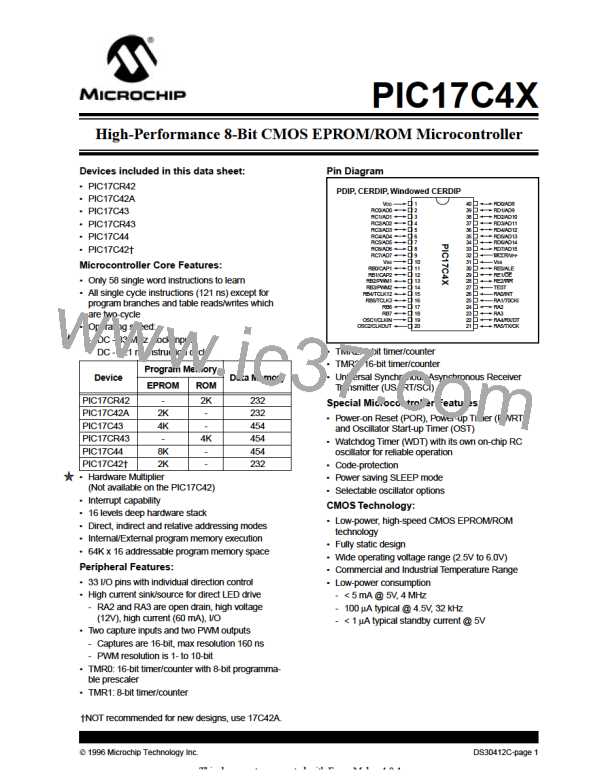PIC17C4X
9.4.1
PORTE AND DDRE REGISTER
Example 9-4 shows the instruction sequence to initial-
ize PORTE. The Bank Select Register (BSR) must be
selected to Bank 1 for the port to be initialized.
PORTE is a 3-bit bi-directional port.The corresponding
data direction register is DDRE. A '1' in DDRE config-
ures the corresponding port pin as an input. A '0' in the
DDRE register configures the corresponding port pin
as an output. Reading PORTE reads the status of the
pins, whereas writing to it will write to the port latch.
PORTE is multiplexed with the system bus. When
operating as the system bus, PORTE contains the con-
trol signals for the address/data bus (AD15:AD0).
These control signals are Address Latch Enable (ALE),
Output Enable (OE), and Write (WR). The control sig-
nals OE and WR are active low signals. The timing for
the system bus is shown in the Electrical Characteris-
tics section.
EXAMPLE 9-4: INITIALIZING PORTE
MOVLB
CLRF
1
;
;
;
;
;
;
;
;
;
;
;
Select Bank 1
PORTE
Initialize PORTE data
latches before setting
the data direction
register
Value used to initialize
data direction
Set RE<1:0> as inputs
RE<2> as outputs
RE<7:3> are always
read as '0'
MOVLW 0x03
MOVWF DDRE
Note: This port is configured as the system bus
when the device’s configuration bits are
selected to Microprocessor or Extended
Microcontroller modes. In the two other
microcontroller modes, this port is a gen-
eral purpose I/O.
FIGURE 9-8: PORTE BLOCK DIAGRAM (IN I/O PORT MODE)
Data Bus
TTL
Input
Buffer
RD_PORTE
WR_PORTE
Port
D
D
0
1
Q
Data
CK
RD_DDRE
WR_DDRE
Q
R
CK
S
EX_EN
CNTL
SYS BUS
Control
DRV_SYS
Note: I/O pins have protection diodes to VDD and Vss.
DS30412C-page 62
1996 Microchip Technology Inc.

 MICROCHIP [ MICROCHIP ]
MICROCHIP [ MICROCHIP ]